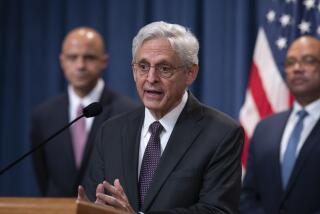Bin Laden Is Named in 9/11 Indictment
- Share via
PARIS — A Spanish judge indicted Osama bin Laden and 34 other suspects on terrorism charges Wednesday, alleging that operatives in Spain played a support role in the Sept. 11 attacks.
The 692-page indictment filed by investigative magistrate Baltasar Garzon sets the stage for the trial of Syrian-born Spaniards who were arrested in late 2001 after six years of investigation. It was one of the first known indictments of Bin Laden for the Sept. 11 attacks.
The case presented by Garzon on Wednesday brought to light fresh details about the Madrid cell’s alleged involvement in terror recruiting, financing and logistical support in Europe, the Middle East and Asia.
Evidence from the FBI, German police and other agencies included in the indictment cited new connections between the Madrid group and figures in the Hamburg, Germany, cell that plotted the Sept. 11 attacks, as well as Al Qaeda leaders in Afghanistan and suspects in May suicide bombings in Casablanca, Morocco.
However, the indictments also drew criticism from defense attorneys that the evidence against their clients is weak.
In addition to terrorism charges, Garzon filed murder charges related to the Sept. 11 attacks against 10 of the suspects, including Bin Laden and three people who are jailed in Spain.
Bin Laden previously has been indicted in cases such as the 1998 bombings of two U.S. embassies in Africa. If he were to be captured by U.S. authorities, it is unlikely that Spain would get the opportunity to try him ahead of the Americans.
In keeping with Al Qaeda’s secretive methods, operatives in Spain supported a plot that was both compartmentalized and global in scope, the indictment says.
While “in the United States the execution was being finalized, in Spain the final details were being taken care of,” Garzon wrote. “All directed by Bin Laden and his criminal structure from Afghanistan.”
The activities in Spain were designed to support the attacks and help some participants escape, the indictment says.
But the case so far looks stronger when it comes to generalized terrorist activity than to direct involvement in the Sept. 11 attacks.
Despite a dogged investigation, the lengthy document shows that Spanish police have not fully determined what role conspirators in Spain played in the plot.
Police are still trying to reconstruct a four-day gap in the movements of accused plotter Ramzi Binalshibh, now in U.S. custody, and hijacker Mohamed Atta when they met in Spain in July 2001, according to the indictment obtained by The Times.
Their meeting in a beach resort near Tarragona was a final step in the execution of the plot, the indictment says. Police are convinced that local accomplices provided a safe venue for a meeting that may have involved a visiting leader or emissary from Al Qaeda’s inner circle.
For the moment, new evidence connects Imad Eddin Barakat, the alleged boss of Al Qaeda’s Madrid cell and one of those indicted Wednesday, to the July meeting, according to the indictment.
As reported by The Times in January, Spanish police believe an Algerian living in the Tarragona area helped set up the meeting involving Atta. The Algerian, an Islamic militant named Mohammed Belfatmi, fled to Pakistan in early September 2001 with Said Bahaji, a fugitive member of the Hamburg cell, according to court documents.
Bahaji had a telephone number for Barakat and, the indictment Wednesday said, a document bearing the name of another Madrid suspect. And wiretaps picked up cryptic conversations involving Belfatmi, Barakat and two Moroccan associates whose tone and timing appear related to the plot, the indictment says.
Garzon concludes that Barakat helped organize “the meetings of Atta and Binalshibh in which the day and the targets were decided. This would establish a direct connection between Barakat and the attacks of Sept. 11, 2001.”
Belfatmi, who was charged with murder Wednesday, remains a fugitive. So does a suspect known only as “Shakur,” whose phone conversations with Barakat in August 2001 tantalize investigators. Calling from London, Shakur told Barakat that he was taking flight lessons and would soon have something to show him, according to court documents. Police have not been able to identify Shakur or confirm the suspicion that he was an Al Qaeda operative.
If the holes have not been filled when the trial starts within the next two years, prosecutors will have a difficult time convicting the accused Sept. 11 accomplices, Garzon’s critics say. Defense lawyers Wednesday repeated their complaints that, although their clients may have had contact with extremists, the charges against them are overblown.
*
Special correspondent Cristina Mateo-Yanguas in Madrid contributed to this report.
More to Read
Sign up for Essential California
The most important California stories and recommendations in your inbox every morning.
You may occasionally receive promotional content from the Los Angeles Times.










